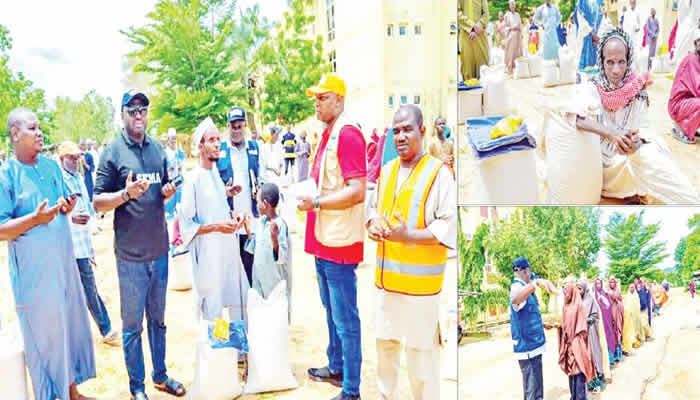The agricultural landscape of northern Nigeria is facing a dire crisis as recent floods have wreaked havoc on farmlands across ten states, stirring alarm among agricultural experts and stakeholders in the agro-allied industry. With the ongoing heavy rainfall, concerns are mounting regarding an impending food shortage that could have severe repercussions for the nation’s food security.
The states most affected by the flooding include Kaduna, Kano, Jigawa, Nasarawa, Taraba, Bauchi, Zamfara, Yobe, Sokoto, and Kebbi. These regions have experienced unprecedented rainfall, leading to the inundation of farmlands and threatening crop yields. Agricultural investor Bello Yakazsi, who operates in the Toro Local Government Area of Bauchi State, has called for the Federal Government to declare a state of emergency in the agricultural sector to address the escalating situation.
Yakazsi emphasized the gravity of the situation, stating, “The current flooding in the North is a peculiar scenario that necessitates immediate governmental intervention. We may not have control over the forces of nature, but we must implement measures to mitigate hunger and starvation in our communities. This is no time for political posturing.”
The persistent rainfall poses a dual threat to agricultural productivity, compounding the challenges already faced by farmers grappling with drought conditions. In Kano State, farmers within fourteen local government areas are particularly apprehensive about potential flooding, as the National Emergency Management Agency (NEMA) has warned of high flood risks. Local farmer Mallam Musa Sani expressed his concerns, stating, “Heavy rainfall has persisted since the beginning of August, and we fear that if flooding occurs, our crops will be lost.”
An official from the State Emergency Management Agency, who wished to remain anonymous, confirmed the agency’s concerns, noting that while a comprehensive report on the flooding is pending, the situation is alarming.
In Jigawa State, the Secretary of the State Emergency Management Agency, Dr. Haruna Mairiga, reported that over 2,744 hectares of farmland have been destroyed by floods across twelve local government areas. The floods have not only devastated crops but have also led to loss of life, with 21 fatalities recorded. Mairiga indicated that the state has suffered an estimated loss of over N1 billion in agricultural produce due to the flooding.
In Zamfara State, farmer Shehu Shinkafi had initially anticipated a fruitful harvest but now faces uncertainty due to recent heavy rains. The State Emergency Management Agency (SEMA) reported that significant rainfall caused extensive damage across the state, particularly in Gummi town, where a flood killed eleven people and affected over 500 homes.
The Nigerian Hydrological Services Agency has issued warnings that many states, including Zamfara, are at high risk of flooding. Their recent forecast indicates that 31 states, comprising 148 local government areas, are categorized as high-risk zones for flooding.
As the floods continue to impact agricultural activities, farmers have been advised to prevent blocking natural water routes within their farmlands to mitigate the risk of flooding and destruction. Alhaji Garba Musa, a large-scale farmer, urged fellow farmers to harvest crops that are ready to avoid losses.
Yobe State has also been severely impacted, with rice farms in riverine areas completely submerged due to relentless rainfall. Musa Dikko, a rice farmer in the region, highlighted the urgent need for on-ground assessments to gauge the extent of the flooding’s impact and to facilitate appropriate relief measures.
Organizations such as the United Nations Development Programme (UNDP), the Food and Agriculture Organization (FAO), and various state emergency management agencies have been called upon to provide swift assistance to the affected farming communities. Muktahr Ahmed, a coordinator with the state SEMA, emphasized the importance of collaborative efforts to alleviate the suffering of those impacted by the floods.
In Nasarawa State, while heavy rainfall had previously been absent, recent torrential rains have caused significant damage to crops. A notable incident involved the destruction of five hectares of farmland belonging to former Commissioner Amb. Lucky Yargwa, who lamented the loss of nearly all his crops. The state’s All Farmers Association has called on the government to provide assistance to support recovery efforts, especially in preparation for dry-season farming.
In Sokoto State, continuous heavy rainfall has led to severe flooding in three local government areas: Tangaza, Gudu, and Gada. The spokesperson for SEMA, Abdullahi Ghani, reported that numerous farmlands have been submerged, resulting in extensive damage to crops.
With the agricultural sector already facing challenges, the recent floods have exacerbated the situation, leading to a decline in agricultural contributions to Nigeria’s Gross Domestic Product (GDP). The National Bureau of Statistics reported that the agricultural sector contributed 21.07% to the GDP in the first quarter of 2024, a decrease from previous quarters.
The situation is particularly concerning for farmers in Adamawa State, where drought has prompted prayer sessions among both Christian and Muslim communities, seeking divine intervention for rain. The Chief Imam of Sengere Mosque highlighted the severe impact of the drought on local farmers, while the Chairman of maize farmers in the state suggested planting drought-resistant crops as an adaptive measure.
In Borno State, farmers are on high alert for potential flooding, following reports of heavy rainfall in neighboring Yobe State. The Federal Ministry of Agriculture has been proactive, advising farmers on flood-resistant crop choices to mitigate potential losses.
As the agricultural sector grapples with the compounding effects of flood and drought, the urgent need for government intervention and support for farmers has never been more critical. The collaboration of various agricultural organizations and state agencies is essential to navigate this crisis and ensure food security for the nation.









